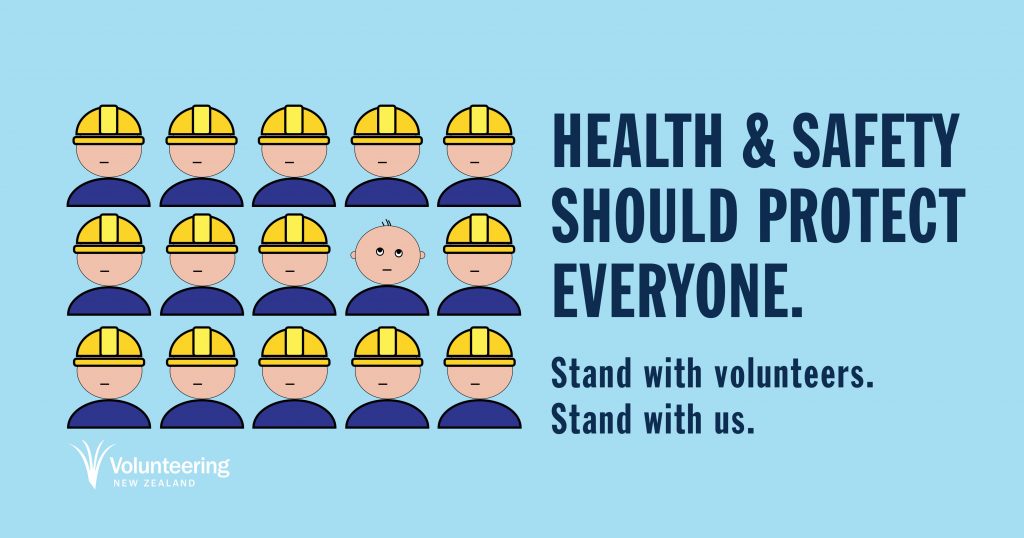Stand with volunteers. Stand with us.
VNZ opposes The Health and Safety at Work (Volunteer Associations) Amendment Bill. Read on to find out more about the Bill and how the public can help volunteers by making submissions against the Bill.

What’s Going On?
Harete Hipango, a National Party MP, has had an Amendment Bill drawn that has broad implications for volunteer associations. The Bill moves to create an exemption from the 2015 Health and Safety at Work Act (HSAW 2015). The exemption would apply to volunteer associations “that employ a person or persons for not greater than 100 hours per week.” The Amendment Bill has now passed its first reading (with the support of National and NZ First) and will move to Select Committee for deliberation.
How Does This Affect Volunteers?
The Amendment would not affect volunteers who carry out work for volunteer organisations without any paid employees. That is to say, fully-volunteer organisations are already exempted from the 2015 legislation. Similarly, volunteer organisations who have several employees working more than 100 hours per week would only be affected by the Amendment if that number were to drop below one hundred hours. These organisations are already classed as PCBUs under the 2015 legislation (a PCBU is a Person Conducting a Business or Undertaking). A PCBU may refer to a single individual or an organisation and may include businesses, government agencies or charities. According to WorkSafe, the regulator, a PCBU “must ensure, so far as is reasonably practicable, the health and safety of workers, and that other persons are not put at risk by its work. This is called the ‘primary duty of care’.”
If the Amendment were to pass, volunteer organisations who are partially volunteer-based but employ a few people part-time or full-time will be exempted from the legislation. This will remove their duty of care under the HSAW 2015 Act. However, duty of care will still be in place under other laws already on the books (torts etc.).
What Supporters of the Bill are Saying
The HSAW Amendment Bill is supported by the National and NZ First parties. According to Harete Hipango (National), the Bill’s sponsor, “the time and cost of compliance is killing the volunteer sector.” She has linked Health and Safety compliance to challenges in recruiting and retaining volunteers. Clayton Mitchell (NZ First) says the original 2015 HSAW Act created unintended consequences.
What VNZ Says
A number of VNZ members opposed the inclusion of partially volunteer-based organisations in the definition of PCBU at the time of HSAW 2015 Act’s passing. Indeed, VNZ reflected concerns about the cost and labour involved in compliance. However, VNZ now opposes the Amendment on the following grounds:
- The arguments that led to the creation of the Act are now being reignited after only a few years. VNZ feels that the exemption for fully volunteer-based organisations was a good compromise and the Amendment is a backwards step. Furthermore, both the Labour and Green parties have signalled their intention to strengthen the Act should they be in a position to do so.
- There is not enough evidence to suggest that the HSAW 2015 Act is disadvantaging volunteer associations in the way that was previously feared. VNZ’s own State of Volunteering Report shows this trend. While respondents to the 2015 and 2016 survey commented on the impact of Health and Safety compliance, respondents to the 2017 survey did not consider regulation to be a major concern, perhaps because the Act is now better understood among workplaces in general. Regulation and compliance in general (which many feel is onerous) should not be confused with regulation specific to Health and Safety.
- Since the Act is already in force, any initial compliance costs expended by existing associations will already have somewhat amortised (i.e. ongoing compliance costs are likely to be minimal). VNZ is not aware of evidence that these compliance costs are a strong disincentive for new associations. The greater risk is that volunteers themselves may be disincentivised due to costs associated with safely carrying out work (e.g. protective equipment) or that associations, believing they are exempt, may become vulnerable to WorkSafe prosecution.
- Creating a new tier of volunteer workers with a new threshold of 100 hours per week may in fact add a new level of complexity for those aiming to comply with the Act. While the Act is well-understood, other forms of duty-of-care may not be.
- The Act works on the principle of universal coverage for all workers. Rather than viewing Health and Safety as a “burden”, VNZ agrees that a culture of Health and Safety needs to be normalised as far as possible.
This last point is the bottom-line: where the safety of workers is at stake – whether paid or unpaid – we believe in protecting those rights. VNZ believes the Act is working well but could be working even better. VNZ opposes the Amendment. Furthermore, VNZ would seek to extend protections up to the level of the equivalent Australian law.
What our Members are saying:
“I totally support your stance on this; Volunteers should not be subject to a lower level of protection at all.”
“… I strongly support VNZ’s view on the proposed changes and consider that to change the existing legislation would be a significant backward step both in the maintenance of safe work places, and equally importantly, would send completely the wrong message with regards to the creation of a positive safety culture.
“In the past 18 months I have delivered some 30 In Safe Hands workshops to over 300 community groups working in the conservation field and I can say with all honesty that there is broad-based acceptance that regular volunteers [volunteer workers] deserve the same right to a safe work place as paid staff.”
“We agree with your submission. We have not received much in the way of concerns about how the act is working now, and it does indeed seem to be well understood by our member organisations. The additional regulation does not seem to have been a burden in the way organisations initially feared.”
“I agree that we need to maintain good practise and ensure that volunteers are treated exactly the same as other employees. ‘Volunteer’ is simply a pay-grade and should not diminish the responsibility to providing adequate safeguards for their health and wellbeing.”
What the Public can do to Help:
Make a submission to the select committee





About The Author: Michelle Kitney
Chief Executive, Volunteering New Zealand
More posts by Michelle Kitney